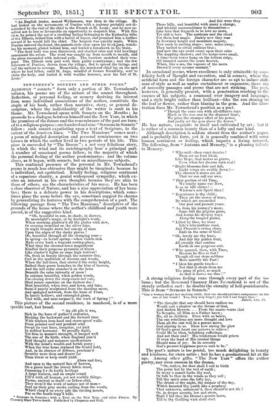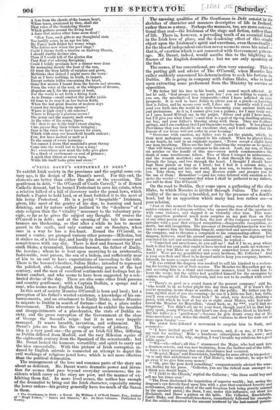TOWNSHEND'S SONNETS AND OTHER POEMS..
ALTHOUGH " sonnets " form only a portion of Mr. Townshend's volume, his poems are of the nature of the sonnet throughout. Reflection, or personal feeling, or scenery deriving its interest from some individual associations of the author, constitute the staple of his book, rather than narrative, story, or general de- scription, where the individuality of the writer is sunk in his theme. Mr. Townshend opens with Sonnets on the Months • he proceeds to a dialogue between himself and the New Year, in which the promises of the future and the remembrance of the past are turn- ed to a religious purpose ; one hundred and nine " Sermons in Sonnets" follow ; each sonnet expatiating upon a text of Scripture, to the extent of the fourteen lines. "The Two Mansions" comes next; a poem of mingled description and personal reminiscence on two houses in which the author lived in two periods of his life. This piece is succeeded by "The Breeze" ; a not very felicitous story, in which the wind and its autobiography bear a principal part. A number of occasional poems follow, in the majority of which the personal feeling of the author predominates ; and the volume closes, as it began, with sonnets, but on miscellaneous subjects. This continual presence of the personal in Mr. Townshend's poems is much less obtrusive than might be imagined ; because he is individual, not egotistical. Kindly feeling, religious sentiment of a capacious charity, a genial widespread sympathy, which ex- cites an interest in his own thoughts because they are akin to those of others, are the characteristics of his muse. He has been a close observer of Nature, and has a nice appreciation of her beau- ties ; there is a delicate power in his descriptions, which some- times place the scene before the eye, sometimes suggest its charms by generalizing its features with the comprehension of a poet. The following passage from "The Two Mansions," descriptive of the grounds of the house where the author's childhood and youth were passed, is of the suggestive kind.
"Oh, beautiful in sun, in shade, in shower, By moonlight's magic, or by daylight's truth, When morning gladden'd all thy glades with dew, Or evening trembled on thy silver lake, Or night brought down her canopy of stars
upon the edges of thy dusky groves ! Oh, beautiful through all the changing year—
In spring—in lavish spring—when violets rich Made every bank a fragrant resting-place, What time the chesnut-trees magnificent Kindled their gorgeous pyramids of bloom Like cluster'd lights on some high festival! Oh, fresh in beauty through the summer day, Cool in thy multitude of streams and woods, When the full trees, that crown'd the rocky height, Bathed their green branches in the blue of heaven, And the tall cedar slumber'd on the lawn Beneath the calm intensity of noon !
In autumn beautiful, when golden woods,
Far-closing down the steep-encircled vale,
Shed mimic sunshine on the darkest day !
Most beautiful, when tree, and lawn, and lake, Seem'd purely sculptured.from the dazzling snow, And spangled network, from theloom of Frost, In lonely hollows, and entangled glens,
Vied with, and near surpass'd, the work of Spring !"
This picture of the second residence, in manhood, is of a more specific cast, but broad.
"An old pile it was, Rich in the hues of gatheed centuries, Mocking the backward and the forward time With timbers iron-hard and storm-proof walls. From pointed roof and pendant oriel Swept its vast lines, irregular, yet knit In noblest harmony. 'So proudly dight, Yetfirm in massive strength, it imaged well The sera of its birth, when England join!d Bold thought and manners uneffeininate With the mind's wealth and lavish poesy ;
When the-true home replaced the feudal hold,
And, in its absence of defence, proclaim'd Security more deep and ' Than tower or keep could yield. Alone and free, And open to the natural face of heaven, On a green knoll the breezy fabric stood, Possessing f rite lordly heritage A large horizon, and an ample round Fill'd with all human yet not worldly things. Farms, ancient as itself-so lichen-clad, They seem'd the work of nature not of man— Sent up their gray smoke curling from the woods, Which clasp'd on every aide the circling meads, Far as the heath-topp'd hills. • Sermons in Sonnets ; with a Text on the New Year, and other Poems. By Chauncy Hare Townshend. Published by Chapman and Hall. And fair were they Those hills, and beautiful with many a change, And trickful unresemblance to themselves— Like love that feigneth.to be love no more, Yet still is love. The sunbeam and the cloud For them had magic. Darkly now they rose In frowning height and motuitain majesty, Now sunk to smiling slopes ; now, miles away, They melted to aErial outlines blue ; And now the eye could count upon their 103 The dappling shadows, and the hedge-rows small. A time-worn tower hung on the loftiest ridge, Oft islanded amidst the azure heaven, When, like a sea, the vapours of the morn Drown'd every meaner summit." In occasional poems, where excellence is only attainable by seine felicity both of thought and execution, and in sonnets, where the artificial form and the foreign character are so apt to induce stiff- ness of style as well as undue curtailment or expansion, there are of necessity passages and pieces that are not striking. The poet, however, is generally present, with a penetration reathing to the essence of his subjects, a command over imagery and language, and a style bright rather than brilliant—like the sun shining on the leaf or flower, rather than blazing in the gem. And the illus- tration fixes Mr. Townshend's position as a poet. "Though the same sun with all-diffusive rays Blush in the rose and in the diamond blaze, We prize the stronger effort of his power, And justly set the gem above the flower." He has nature, exquisite in itself and cultivated by art ; but it is rather of a common beauty than of a lofty and rare kind. Although description is seldom absent from the author's pages, and is probably his forte, yet it is generally combined with some human sentiment or feeling, which imparts a living interest. The following, from "Autumn and Memory," is a pleasing tribute to Memory. "The thought that any should have endless wo Would east a shadow on the throne of God, And darken Heaven. . . From the scarce-warm clod To Seraphs, all Him as a Father know ; He, all as children. Even with us below, The one rebellious son more thought and love .Than.all the rest will in a. parent move, God stirring in us. Then how strong the glow Of God's great heart our sorrows to relieve ! Could He be blest, beholding sufferings, And not their end ? His tenderness would grieve If even the least of His created things Should miss of joy. In its sereuity God's present happiness proves ours to be." The -poet's nature is too genial, too much delighting in beauty and kindness, for stern satire ; but he has a‘goodnaturedlit at the age. Among other gifts, "The New Year" offers the author poetry, nay even slimes in the drama. "Or, rather, for thee shall I call to birth The poesy hid by the veil of earth; In many a sunset bathe thy soul, Or talk tothee in the winds as/hey roll ; Till thy spirit seize the lofty lay, The dream of thy night, the despair of thy day, Which haunted thy youth liken prophecy That unknown, unhonour'd, thou should at not the ? Or, in deeper accents, low and stern, Shall I bid thee the Drama's secrets learn, Till to thy thrilling wish shall start "Who said—thou eanst deceive ? Thou art no fond Ideal, Like Hope, that makes us grieve, Even when her dreams turn real! "Bright blossoms fade and fall, Light wings are swiftly flown !- Thy ehasten'd stores are all That we can call our own. "That portion of old Time, We fondly name our Now, Is as an idle chime !— Wisdom's sole Spirit thou! " Repentance is thy child ; Thou art the source of tears, By which are reconciled Our past and present years. "As, from his journey's maze, Some bill the pilgrim gains, And learns his devious ways Along the tangled plains, "Lifted by thee, we trace Life's labyrinthine road, And Pleasure's erring chase Ends in the arms of God! "Oh, lovely are thy hues, And fair thy golden fruit, All sweetly that confuse Earth in one gorgeous suit. "Why quarrel, then, with Time, Because he flies so fast ? Though all our steps sublime More sanctify the Past! "I bless his gentle touch— Not that it steals from me The pang of grief, so much As that it leaves me thee !" A strong religious feeling runs through every part of the vo- lume; but the Reverend Chauney Hare To,:riashend is not of the sternly orthodox cast : he doubts the eternity of hell-punishments. This is from "Sermons in Sonnets." Can a woman forget her sucking child, that she should not have compassion on Uni- son of her womb ? Yea, they may forget; yet will I not forget thee." , Isaiah, ails. 15. A lyre from the chords of the human heart, Whose tones, awakened by the; shall stir That voice of the thundering theatre Which gathers around the living head A fame that makes other fame seem dead ? "New Year, such gifts to my thoughtful state Too tardily come, in an age too late. My Fancy hath folded her weary win Who listens now when the poet sings ? Could I rhyme forth a treatise on Railway Shares, I should warble diviner airs, Than if I could tell of the glories elhn That float o'er adoring Seraphim; Could I boldly proclaim how a dinner were done By managing merely the heat of the sun, Or treat the deep battle of surplice and gown, Methinks that indeed I might move the town : But as I have nothing, in truth, to impart, Except certain trifles concerning the heart, Some few secrets I learnt from the forests and streams, From the voice of the soul, or the whispers of dreams, Hopeless am I, for the present at least, For the world to set forth a fitting feast. As to Drama—small comfort thy proffer yields Of fame to be reap'd on her barren fields, When the last great Roscius of modern days Cannot her drooping form upraise ! Where is high story's old renown? Where is Tragedy's glorious crown? The pomp and the majesty melt away At the voice of the syren, Opera. Oh! dear to me is the bird's sweet singing, Unto joyous May their tribute bringing ; Dear is the voice we have known for years, Which with song our household hearth endears ; Few, few have melted or melt as I To the sound of every harmony : Yet cannot I deem that mankind's great throng Came into the world but to hear a song! No! everywhere now must the lofty give place To a throb of excitement—a soul of grimace ; A spirit that titters at every turn While life itself looks grim and turn,



























 Previous page
Previous page